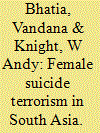| Srl | Item |
| 1 |
ID:
117902


|
|
|
|
|
| Publication |
2011.
|
| Summary/Abstract |
In this article we compare two conflicts in South Asia-civil war in Sri Lanka and the insurgency in Kashmir-to investigate the enabling conditions for female suicide terrorism in the former, and the lack thereof in the latter. We conclude that female suicide terrorism is a product of several inter-related factors that feed into each other: (i) tormented society, (ii) individual grievances, and (iii) a terrorist organisation with an effective indoctrination structure. Thus, rather than focusing on the individual motivations behind the female bombers, it is important to situate them in specific socio-political contexts.
|
|
|
|
|
|
|
|
|
|
|
|
|
|
|
|
| 2 |
ID:
122300


|
|
|
|
|
| Publication |
2013.
|
| Summary/Abstract |
This article examines the nuclear nonproliferation policy of the Clinton administration (1993-2001) toward India. It is argued that initially President Clinton was focused on a "capping, rollback, and eliminate" approach toward Indian nuclearization. But, after India conducted nuclear tests in 1998, there was a discernible change in Clinton's policy toward India, which has largely gone unrecognized. The Clinton administration considerably shifted the nuclear goalposts-from the cap, rollback, and eliminate Indian nuclear weapons-to merely the exercise of nuclear restraint by India. This, in turn, implied a tacit acceptance of the nuclear weapons possessed by India. The Clinton administration cleared the languishing nuclear debris and created space for the next administration to reset the anomalous nuclear relationship with India.
|
|
|
|
|
|
|
|
|
|
|
|
|
|
|
|
| 3 |
ID:
114344


|
|
|
|
|
| Publication |
2012.
|
| Summary/Abstract |
The 2005 US-India nuclear pact created ripples of controversy and debates within in a short period of time. In the US, the nuclear agreement was weighed vis-à-vis the non-proliferation regime-does it strengthen or weaken the regime? On the contrary, in India concerns were raised regarding the implications for India's strategic as well as civilian nuclear programmes. This article highlights the disjuncture in the concerns raised in the US and India. Using David Mutimer's constructivist analysis, it is argued that this divergence is due to their contrasting perspectives on nuclear technology as regards 'proliferation' and 'disarmament-development'.
|
|
|
|
|
|
|
|
|
|
|
|
|
|
|
|